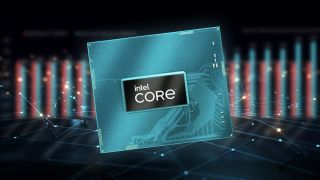Intel's 14th Gen Core mobile processors for laptops gain Wi-Fi 7 and Thunderbolt 5 to offset mostly lackluster spec bumps
Modest gains for the Core i9-14900HX in a slight step up over the 13th Gen.

What you need to know
- Intel's 14th Gen Core mobile processors, led by the Core i9-14900HX, are unveiled at CES 2024 with advanced connectivity like Thunderbolt 5 and Wi-Fi 7.
- Touted as the 'world's fastest mobile processor,' these new chips boast potential gaming enhancements with Intel's custom tuning tools.
- The i9-14900HX represents a modest upgrade over its 13th Gen HX-Series predecessors, but the remaining 14th Gen range offers an expected boost in cores, threads, and potential performance.
This year's Consumer Electronics Show (CES) doesn't technically open its doors until tomorrow, January 9. Nevertheless, Intel has already dropped the details on its 14th Gen Core mobile branch of processors for laptops aimed at gamers and creators. The new high-end Intel Core i9-14900HX headlines a refreshed range with 24 cores (8P, 16E) and 32 threads, but Core i7 and Core i5 alternatives come with fully listed specs.
Roger Chandler, Intel Vice President, describes how "enthusiasts on the go can now enjoy the best mobile experience available today with our HX-series processors" alongside unveiling its 14th Gen 65-watt and 32-watt Core desktop CPUs and an all-new Series 1 family for low-power portable devices. Taking pride in the performance-focused HX mobile chips, Intel labels them as the 'world's fastest mobile processor' with benchmark results to back it up. Let's dig into the details.
What's new for Intel laptops?




Arguably, the most significant advancement with the 14th Gen of Intel Core mobile processors comes in the way of its upgrade to Thunderbolt 5 technology for physical connectivity and Wi-Fi 7 support for the latest wireless networking. Thunderbolt 5 provides up to 120Gbps bandwidth, with 80 Gbps for bi-directional transmissions, used for multi-function docks or modern external displays. Discrete Intel Wi-Fi 7 support means the absolute fastest possible networking speeds with supported routers and compatible devices, and Bluetooth 5.4 supports the latest wireless peripherals with the lowest latency.
Overclocking support will depend on each OEM, but gaming laptops can take advantage of the Intel Extreme Tuning Utility (XTU) and push for extended performance if the cooling solution is up to the task. That also extends to memory with XMP for SODIMM in laptops, often tied to a custom-made profile in a per-manufacturer companion app similar to Razer Synapse. Pushing the HX-Series up to 5.8GHz with dedicated hardware running on PCI Gen5 should yield some powerful creator-focused and gaming-centric laptops in 2024.
Performance promises versus AMD





Intel selects the AMD Ryzen 9 7945HX as the primary all-around competitor to its Core 14th Gen i9-14900HX during in-house testing, with benchmarking test results showing the AMD Ryzen 9 7945HX3D listed alongside as a gaming-specific rival. The most significant lead comes in lesser-known titles like World of Tanks and Total War: Warhammer III, although decent leads are seen in mainstream titles like Far Cry 6 and Starfield.
Frame consistency is highlighted as a particular boast for the i9-14900HX, with Tom Clancy's Rainbow Six Siege seeing a lead, undoubtedly making players of the online multiplayer shooter happy should they upgrade to any upcoming gaming laptop loaded with the high-end CPU.
Intel Application Optimization (APO) also promises 'possible' gaming improvements with the 14th Gen mobile processors. However, each title needs its own profile to take advantage of the Intel Dynamic Tuning (DTT) framework. These claims aren't too extravagant to be doubted, but the specifics need real-world testing to be confirmed. With OEM partners in Alienware, ASUS, Razer, and more, gaming laptops featuring these brand-new HX-Series chips will soon be available, and we'll aim for hands-on time to see if these charts are accurate.
Core i9, i7, and i5 HX-Series specs

Intel's 14th Gen Core mobile processors come with a list of lofty specs across the board that we expected from its latest mobile chips. Although the clock and thread count on the high-end Core i9-14900HX matches that of the 13th Gen i9 chips in the HX-Series, the max Turbo frequency clocks are slightly higher. Intel UHD internal graphics performance is practically unchanged, besides the minor bump of up to 1.6GHz max frequency on the Core i7-14700HX.
The differences become more apparent when inspecting the mid-range 14th Gen mobile Core i7 and Core i5 processors, noting a slight increase in core and thread counts. For example, a 13th Gen mobile Core i7-13700HX featured a 16-core(8+8) 24-thread configuration, whereas its 14th Gen equivalent, the mobile Core i7-14700HX, lists a 20-core(8+12) 28-thread bump. If the MSRP for each option remains roughly the same as the previous generation, consumers can expect a healthy increase in raw performance to go alongside Intel's suite of cutting-edge connectivity tech.
A slight push ahead for a 'new' generation
Initial impressions of Intel's latest 14th Gen Core mobile processors, especially the high-performance i9-14900HX, don't completely shy away from their impression of being incremental upgrades. At least with the promise of enhanced connectivity, superior performance, and cutting-edge technology in Thunderbolt 5 and Wi-Fi 7, Intel's new lineup is at least ready to offer more powerful gaming laptop hardware to OEMs at (hopefully) a similar MSRP to its 13th Gen.
Our Editor-in-Chief, Daniel Rubino, and our Tech and gaming Editor, Rebecca Spear, will both be on the floor at CES 2024 in Las Vegas throughout the week, looking to speak directly to various brands, including Intel, to quiz them on the specifics of their claims and get some hands-on experiences.
Get the Windows Central Newsletter
All the latest news, reviews, and guides for Windows and Xbox diehards.

Ben is the channel editor for all things tech-related at Windows Central. That includes PCs, the components inside, and any accessory you can connect to a Windows desktop or Xbox console. Not restricted to one platform, he also has a keen interest in Valve's Steam Deck handheld and the Linux-based operating system inside. Fueling this career with coffee since 2021, you can usually find him behind one screen or another. Find him on Mastodon @trzomb@mastodon.online to ask questions or share opinions.